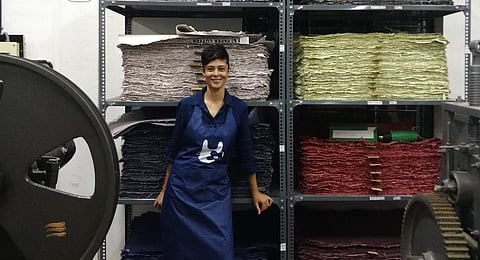

Paper is made from trees — this is what we were taught at school. But I bet you didn't know that trees are not even a good source of cellulose, an important ingredient in the papermaking process. They contain only 40 per cent cellulose. Therefore, about 45-80 per cent of chemicals are added so that the paper formed can be smooth and sized. This also turns the water black, thereby wasting thousands of litres of water a day. Although the paper we get might be cheap, the environment pays a hefty price. Sure, digital is the way to go but imagine a world where you can't hold a book and read. Sad, isn't it? To make paper, over 3.3 million hectares of forest are cut down. We can go on with these alarming facts but is there a way to prevent this? Hailing from Coorg, a place that boasts of lush greenery and scenic beauty, entrepreneur Kavya Madappa found a way to deal with the problem. She set up her own venture Bluecat Paper in 2017, where not a single tree is cut to create paper.
Kavya tells us that the idea was to save trees, reduce waste and save water. After researching ways to manufacture tree-free paper, Kavya discovered that only two things are needed to make paper — pulp and water. Any pulp that has a concentration of over 68 per cent cellulose is perfect for making paper. "The paper we make is 100 per cent tree-free, we use textile waste such as cotton and linen rags, coffee husk, flax, lemongrass, banana, bagasse, mulberry and corn husk. We collect all waste from textile factories and go to farms and educate farmers to segregate waste and send it to the factory instead of burning and causing more pollution," says Kavya. Through their operations at the 20,000 sqft factory in Peenya, Bengaluru, Bluecat Paper collects around 20 tonnes of secondary waste from 100 farmers and five factory units every month. They are not only helping the environment by not letting the waste pile up in landfills, but they also pay them anywhere between `8-120 per kilogram. In the process of making tree-free paper, Bluecat Paper helps save about 30 tonnes of wood per month and a minimum of 55,000 litres of water per day!
Kavya, who hails from Mercara in Coorg district, grew up in a small town surrounded by trees and birds. She tells us that the respect and love for nature and its flora and fauna are basic instincts. Kavya pursued her Bachelor’s degree in Commerce from St Joseph’s in Bengaluru in 2000, following which she worked in the corporate sector for a few years. She then decided to come to return to Coorg in 2005 to become an entrepreneur. Before starting Bluecat Paper, Kavya founded and started a resort called Amanvana on the banks of River Kaveri, in Kushal Nagar, Coorg. Amanvana has over 300 species of flora and fauna, is home to 65 species of birds and sustainability is a key concept here. While running Amanvana, Kavya realised the massive usage of paper in her business and how trees were being cut to make conventional paper. She wasn't too thrilled by this fact and went on her own journey to look for eco-friendly processes to create paper. "I took a papermaking course at Kumarappa National Handmade Paper Institute in Jaipur to learn more about papermaking. This inspired me to start the Bluecat Paper. The idea of saving trees was too awe-inspiring for me to be afraid of whatever challenges I was going to face. I spoke to a lot of researchers, experts, horticulturists and others to find out that cellulose could be obtained from several waste materials like coffee husk, lemongrass and more," says Kavya. The machinery Kavya uses at her factory is indigenous, all made in India and manufactured in Haryana, Kalpi, Jaipur and Coimbatore.
At Bluecat, they also make notebooks, bags, folders, gift boxes, bowls from cotton maché along with lampshades, hanging lamps and string lights, and many more visually appealing eco-friendly products. They also customise wedding invitations for those who do not want conventional invitations. "We make paper from cotton, linen and other farm waste. Thereafter, we convert this paper lovingly into products. Our team of craftsmen and designers make visually appealing products that are functional too. These products are 100 per cent sustainable and eco- friendly," adds Kavya. Speaking about their future plans, she says, "We want to make the process of making tree-free paper faster. Currently, the process is quite lengthy and therefore, laborious. We also hope to make tree-free paper mainstream." As she signs off, Kavya has a piece of advice that youngsters could use, "Please think twice before you print. Reduce using tree paper, use tree-free paper and support the cause. Recycle water when you can for a sustainable future."
Other products:
